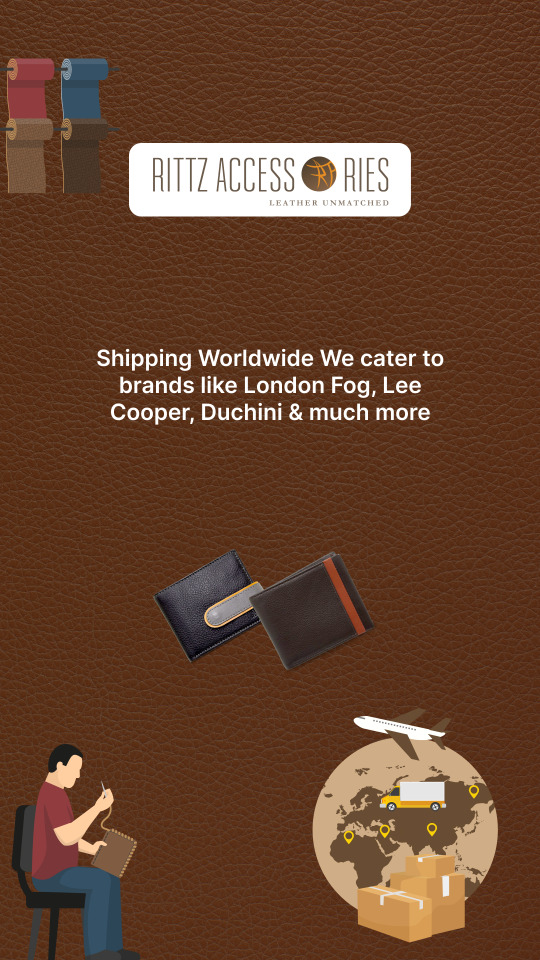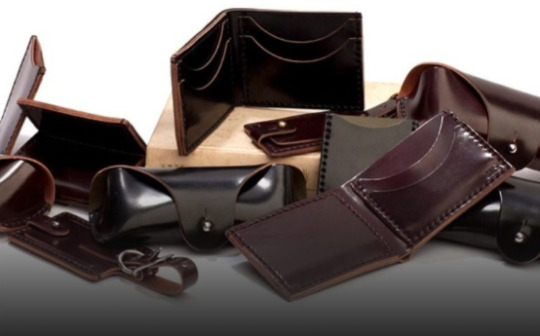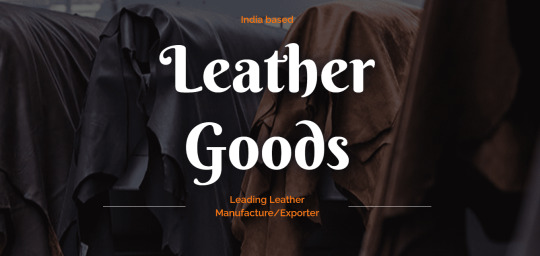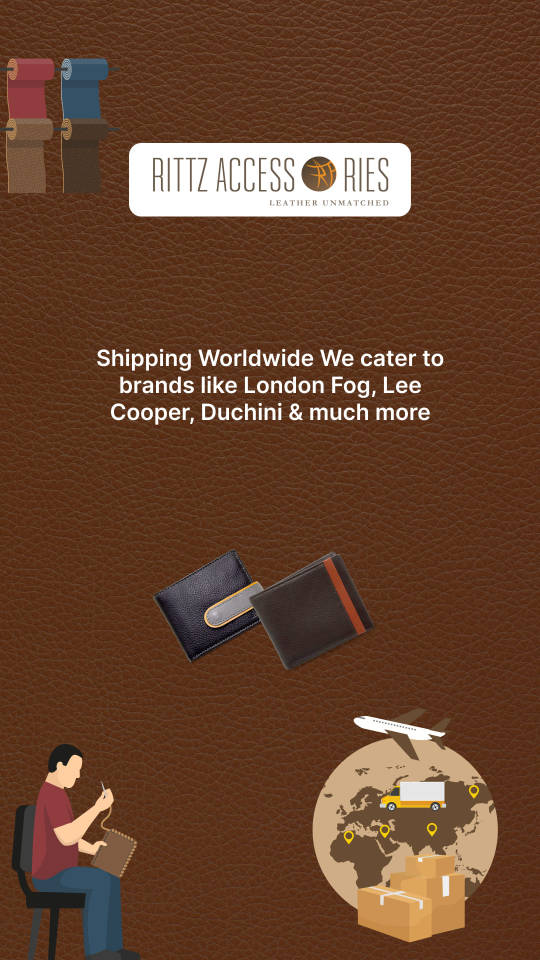#LeatherManufacturersChennai
Explore tagged Tumblr posts
Text
Top-notch Leather Manufacturers in Chennai | Customized Solutions
Introduction
Leather Manufacturing which is one of the well-known industries in Chennai has made a significant contribution to the development and reputation of the city that already thrives in a diverse economy and rich cultural legacy. The leather business is a fascinating fusion of innovation and tradition, bringing together the traditional artistry of leather craftsmanship with environmentally friendly practices and cutting-edge technology. Rittz Accessories will cover the sector's development, traditional methods of producing leather, importance to the local economy, and the innovation that has been elevated by Leather Manufacturers in Chennai to a position of prominence around the world.

Protecting cultural heritage
While manufacturing leather, historical preservation is crucial to upholding the product’s authenticity and originality. The preservation of old processes and their transmission through apprenticeships and training programmes are very important to manufacturers. Due to this commitment to maintaining the skill, Chennai's leather goods continue to be recognisable and draw discerning clientele who value fine craftsmanship.
Artisanal Craftsmanship
The leather industry is extremely dependent on skilled artisans, who are renowned for their meticulous craftsmanship. Their knowledge and meticulous attention to detail turn simple leather goods into works of art. The leather is molded and shaped by the artist’s hands to create a variety of designs and styles that incorporate both classic themes and modern fashions.
These artisans operate from small workshops or as part of larger enterprises, frequently in tight-knit communities. Each product is distinctive and bears the imprint of their remarkable talents owing to their devotion to their craft, which distinguishes Chennai's leather goods on the international market.
Strengthening of Artists
The talented artisans who devote their entire lives to honing their trade are a vital component of the leather industry's success. In order to assist the welfare of artisans and their families and ensure a sustainable livelihood for the craftsmen who make up the industry's backbone, many manufacturers also work with NGOs and social enterprises. Manufacturers have taken action to empower these craftsmen because they understand how important they are by providing them with fair wages, better working conditions, and access to programmes for skill development.
Significance in the Local Economy
With thousands of job opportunities, Chennai's leather manufacturing sector has grown to be a key economic force in the city. The business generates a large network of jobs, from tanneries to workshops, benefiting skilled workers, technicians and support staff.
Additionally, the production of leather in the city has also given rise to a number of allied industries, including suppliers of machinery, chemicals for the industry and companies focused on exports. The expansion of these supporting industries increases the sector's contribution to Chennai's economy.
Issues and Sustainability Projects
Even though the leather sector is thriving with global success, it still has its share of problems, particularly with regard to sustainability and the environment. For example, while the quality of traditional tanning is highly regarded, it is not practiced as it can produce a lot of waste and effluent. Many manufacturers have embraced sustainable practices and new technologies to reduce their environmental impact in order to address these problems.
To lessen pollution and encourage environmental responsibility, efforts have been made to create eco-friendly tanning techniques, water recycling systems and waste management procedures. In addition, the sector has emphasized ethical behavior and sustainable raw material procurement to meet the rising demand for ecologically friendly products.
Innovation Infusion
The leather industry has welcomed technological advancements to increase productivity and product quality as it embraces modernity. The manufacturing process has been significantly improved because of the advanced equipment and computer-aided design (CAD) tools that improve production capabilities without sacrificing the product quality.
Additionally, to appeal to the customers with environmental sensitivity,new leather substitutes and sustainable materials have been developed in response to advances in research and development. With the global trend of ethical purchasing, vegan leather that is made from plant-based materials or recycled plastics has become a popular option.
Exports and Recognition Worldwide
The leather manufacturing sector in the city has also been acknowledged and appreciated from throughout the world for its high-quality goods, affordable prices and adherence to international standards. The city now exports a sizable amount of leather products to numerous nations across the globe including the United States, European countries and other Asian markets.
The availability of a competent labor population,quick access to raw materials and a strong manufacturing infrastructure has established Chennai as a center for leather exports. The industry's success in international markets has also made it easier for foreign investments, which has further fueled its development and growth.
Collaboration with fashion designers
Leather Manufacturers in Chennai aggressively collaborate with fashion designers both domestically and globally to stay current in the ever changing fashion industry. Through these collaborations, the conventional leather manufacturing process is infused with new concepts, fashions, and designs, resulting in cutting-edge and modern collections that appeal to a wider market.

Chennai's leather manufacturing industry remains active and adaptive to altering customer demands by fusing the skills of craftspeople with the vision of fashion designers, giving rise to a captivating blend of classic elegance and modern aesthetics.
Diversity and Inclusivity
The openness and diversity of Chennai are exemplified by the city's leather industry. It fosters a sense of solidarity by bringing together individuals from varied communities, backgrounds and geographical areas. Regardless of caste, religion or gender, competent artisans offer their distinctive viewpoints and subject-matter knowledge, enhancing the sector with their unique skills.
This varied workforce not only supports the sector's social fabric but also fosters a climate of understanding and tolerance, making Chennai's leather industry a role model for inclusive growth.
Marketing and Brand Building
In order to increase their market share, leather manufacturers have just realized how critical strong branding and marketing techniques are. They make investments in creating enduring brand identities that are a reflection of their history, excellence and dedication to sustainability.
Additionally, they use the strength of digital platforms and e-commerce to establish direct contact with customers everywhere. They build a devoted consumer base of people who value authenticity and ethical consumption by showcasing the craftsmanship, behind-the-scenes procedures and ethical ideals that go into their leather products through compelling storytelling and social media campaigns.
Taking Care of the Supply Chain
The leather production sector is supported by a long-standing supply chain that reaches outside of the city. Manufacturers actively work with suppliers, logistics providers and governmental organizations to ensure smooth operations, from procuring raw materials from different locations to shipping finished goods to foreign markets ensuring consistent quality, prompt delivery, and ethical sourcing practices.
Adaptivity and resilience
The leather manufacturing sector has also proven to be remarkably resilient and adaptable in the face of difficulties over the years. Numerous challenges have been given by the economy, shifting policies and international events, but the sector has constantly found ways to adapt and endure.
The manufacturers have developed consistently, maintaining at the forefront of the business and reaffirming their position as leaders in the leather production field by accepting change and absorbing feedback from clients and partners.
Conclusion
The leather manufacturing business in Chennai is a prime illustration of how innovation and tradition can coexist together to produce a strong economic sector. The business has consistently changed to meet shifting demands while retaining its cultural legacy, starting with its historical roots in ancient trade and ending with its current prominence as a global exporter.

Leather Manufacturers in Chennai are not only ensuring a profitable future for the industry but also strengthening the city's standing on the global arena as they continue to embrace sustainability and technical improvements. This business continues to serve as an example for other industries and a testament to the transformative power of embracing both heritage and progress because of its flawless fusion of tradition, craftsmanship and innovation.
0 notes
Text
Discover the finest craftsmanship in leather goods at Rittz Accessories, one of the leading Leather Manufacturers in Chennai. Explore their extensive range of high-quality leather products, including bags, wallets, belts, and accessories. Each item is meticulously crafted to perfection, ensuring durability and style that will elevate your fashion statement. Contact us today to explore our exquisite collection.
Looking for top-notch Leather Manufacturers in Chennai? You've come to the right place! Rittz Accessories, our esteemed leather manufacturing company is renowned for its exceptional craftsmanship and commitment to delivering high-quality leather products. With years of expertise and a passion for excellence, we specialise in producing premium leather goods that exude style and durability.
#LeatherManufacturersChennai#ChennaiLeatherGoods#LeatherManufacturers#LeatherAccessories#LeatherGoods
0 notes
Text
Unleash your Style with Rittz Accessories: Premier Leather Manufacturers in Chennai
Introduction
Leather manufacturing has a long-standing history and continues to be a sought-after industry due to the durability, versatility, and timeless appeal of leather products. However, concerns about environmental impact and sustainability have brought to light the need for finding a balance between leather manufacturing and environmental responsibility. Rittz Accessories intends to explore the challenges faced by the industry, innovative solutions, and steps taken by responsible Leather Manufacturers in Chennai to mitigate their environmental footprint.

The Environmental Impact of Leather Manufacturing
Like every other business, leather manufacture has an influence on the environment. The procedure enlists a number of steps, including the acquisition of raw materials, tanning, dyeing, and finishing, each of which has an impact on the environment. The enormous water use and probable water contamination caused by tanneries is one of the key issues. Additionally, the tanning process uses chemicals that can be hazardous to both human health and the environment, such chromium salts. Another urgent concern is deforestation, which is a result of the leather industry's need for hides.
Challenges and Roadblocks
It might be difficult to strike a balance between leather production and environmental responsibility. Sustainable manufacturing objectives are hampered by conventional manufacturing processes, which frequently rely on resource-intensive techniques. The issue is further complicated by societal and economic constraints, the culture of fast fashion, and market expectations for cheaper and quicker manufacturing. However, these difficulties also provide chances for ground-breaking fixes and broad industry transformation.
Innovations and Sustainable Practices
Fortunately, the leather production sector is moving towards more creative and ecological methods. Many businesses are switching to environmentally friendly alternatives to lessen their reliance on dangerous chemicals, such vegetable tanning. Additionally, the utilisation of water recycling systems, renewable energy sources, and enhanced waste management practises all contribute to reducing the environmental effect. Innovative technologies are also developing as workable alternatives, including as enzymatic processing and bio-based tanning chemicals.
Transparency and Ethical Sourcing
Ethical sourcing methods and environmental responsibility in the leather industry go hand in hand. Traceability is a top priority for responsible producers, and they make sure that the raw materials, such as animal skins, originate from ethical and ecological sources. This entails advocating for animal welfare, supporting fair trade, and abiding by strict laws that forbid using endangered animals.
Consumer Awareness and Responsible Choices
In order to promote environmental responsibility in the leather business, customers also play a critical role. By purchasing goods from businesses dedicated to sustainability and openness, we encourage more environmentally friendly procedures. By assisting businesses that prioritise eco-friendly production techniques and ethical sourcing, consumers are making it abundantly apparent that they value environmental responsibility.
Sustainable Initiatives by Leather Manufacturers
Various initiatives are being implemented by ethical leather producers to solve the environmental issues related to the production of leather. Following are some noteworthy sustainable initiatives used by forward-thinking businesses:
Water Management and Treatment: For environmentally aware leather makers, saving water and managing wastewater responsibly are top objectives. To minimise pollution and cut back on water use, many people are investing in water purification facilities. Manufacturers may recycle and reuse water by using cutting-edge technology like reverse osmosis and biological treatment systems, which reduces their demand on freshwater supplies.
Energy Efficiency: Energy-efficient practices are being adopted by leather makers to lessen their carbon footprint. They are using renewable energy sources including solar and wind power, establishing energy management systems, and optimising the use of their machines. Energy-saving practises not only lessen their negative effects on the environment, but they also save money, making sustainability a sensible financial decision.
Waste Reduction and Recycling: Within the Leather Manufacturers in Chennai, creative waste management techniques are taking off. Manufacturers are putting waste segregation systems in place to separate various waste kinds, enabling efficient recycling and appropriate disposal. Leather offcuts and scraps can be used in other sectors or recycled into new items, reducing the amount of trash that is disposed of in landfills.
Adoption of Sustainable Materials: Healthy leather manufactures are looking at alternative materials in addition to manufacturing methods to lessen their environmental effect. They look for eco-friendly substitutes for linings, packaging, and trimmings, such as those made of recycled or plant-based materials. With this method, sustainability is extended across the full product lifespan.
Collaboration and Certifications:To exchange information, share best practices, and promote collective sustainable innovation, leather producers are actively collaborating with trade groups, environmental organisations, and research institutes. Furthermore, certifications like the Leather Working Group (LWG) accreditation offer transparency and confirmation that producers follow stringent ethical and environmental criteria.
Continuous Improvement and Transparency: Continuous improvement is prioritised by sustainable leather producers. They frequently evaluate their methods, tools, and sources of raw materials to find potential areas for improvement. Manufacturers help consumers make educated decisions and comprehend the environmental effect of their products by being transparent about their practices.
Benefits of Balancing Leather Manufacturing and Environmental Responsibility
Every individual must be concerned about striking a balance between leather manufacture and environmental health.Some key point to note are:
Environmental Protection: Leather producers help to protect ecosystems and natural resources by using sustainable practices. The industry's ecological footprint may be reduced and the environment can be preserved for future generations by using less water, managing waste properly, and using less energy.
Improved Air and Water Quality: Environmentally friendly leather production techniques, such as wastewater treatment and minimal chemical use, result in better air and water quality. Manufacturers contribute to preserving the health and wellbeing of people residing close to tanneries by reducing pollution and guaranteeing proper waste disposal.
Enhanced Brand Reputation: Leather producers receive a competitive edge in the market by prioritising environmental responsibility. Brands that exhibit a dedication to sustainability and transparency draw in customers who care about the environment and appreciate products that were created responsibly. This promotes a favourable brand image and increases client loyalty.
Long-Term Viability: The industry's long-term success depends on finding a balance between leather production and environmental responsibility. Manufacturers may future-proof their operations by using sustainable practices, guaranteeing compliance with changing environmental requirements and customer expectations. In a company environment that is continually evolving, this helps firms remain relevant and resilient.

Conclusion
As we all know, it requires time to strike a balance between the production of leather and environmental responsibility. Although there are obstacles, ethical manufacturers are making efforts to lessen their impact on the environment through sustainable practices, cutting-edge technology, and ethical sourcing. According to Leather manufacturers in Chennai, buyers can make a difference by choosing wisely and backing companies that value sustainability. By cooperating, the leather sector may grow while reducing its negative environmental effects, conserving resources, and assuring a more sustainable future.
#LeatherManufacturersChennai#ChennaiLeatherGoods#LeatherManufacturers#LeatherAccessories#LeatherGoods#RittzAccessories
1 note
·
View note